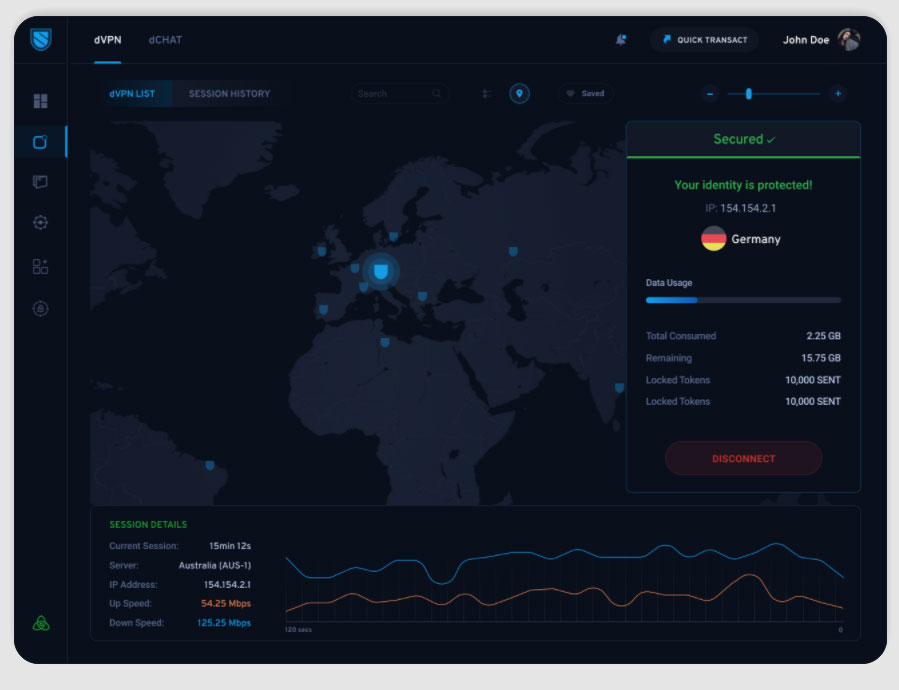dVPN network Sentinel initiates bandwidth sharing on the Cosmos IBC testnet

CryptoNinjas » dVPN network Sentinel initiates bandwidth sharing on the Cosmos IBC testnet
Sentinel, a decentralized VPN protocol built on Cosmos SDK-based architecture, today announced that bandwidth sharing will become available for testing on the Sentinel Turing-4 Cosmos IBC-enabled testnet starting in May. This transition marks a significant leap forward for the development of dApps that can be built on top of the Sentinel protocol as part of its up-and-coming provably private Web3 stack.
Sentinel has supported Cosmos from the very beginning…
The Cosmos IBC went live in February and enables dApps building on the Cosmos blockchain to interoperate with other blockchains in a fast and seamless way. As a result of the testnet migration, Sentinel users will be able to take advantage of the underlying Tendermint Byzantine fault-tolerant (BFT) protocol to enable cross-blockchain compatibility with instant finality.
Blockchains that use similar consensus algorithms, such as Proof-of-Stake (PoS), will be able to communicate with each other via Cosmos IBC using the Tendermint protocol. This alignment empowers dApps that build on top of the Sentinel protocol to make use of its provably private decentralized communications network.
In a statement regarding what the scalability and utility of Cosmos IBC will mean for the Sentinel network at large, Co-Founder and CEO of Exidio, a contributor to the Sentinel dVPN Protocol codebase, Dan Edlebeck said, “We envision Sentinel having millions of daily users as we launch our white-label tech. Cosmos IBC will allow us to accommodate any amount of users to the Sentinel protocol through horizontal scalability. The focus being ease of use means we will allow any kind of payment that Sentinel dVPN nodes want to accept. In other words, any IBC compatible coin can potentially become a way to pay for Sentinel’s dVPN services.”
Echoing Edlebeck’s sentiment, Peng Zhong, the CEO of Tendermint said, “The permissionless transfer of tokens’ value across chains is a historic moment on the timeline to a valuable internet of blockchains. We will continue to focus on building the Cosmos Hub as the heart of the interchain — enabling trade and connecting politically sovereign chains to create a new paradigm for economic exchange. We have a defined roadmap in place to realize this future, and will continue to develop services for the Cosmos Hub that will create immense value for all the chains that connect to it.”
Sentinel is also very happy to be integrated with Keplr, an interchain wallet. The Keplr wallet integration will make the broader Sentinel network IBC-ready right after the Cosmos Hub is upgraded and right in time for the launch of Gravity DEX, a decentralized exchange bringing DeFi to Cosmos.
These additions complement the ambition of the community to see Sentinel as one of the first Cosmos-native assets. The goal is for Sentinel’s most liquid trading pair will be priced in ATOMs to align with Cosmos’ vision that ATOM will be the reserve currency of the interchain; where every asset will be priced in ATOMS, making it both a store of value and a medium of exchange. Sentinel will continue to build on Cosmos to complement the peg between Sentinel and Cosmos both economically and technically.
Testing
Once the testnet build has passed inspection from contributors and the broader development community, Sentinel users will be able to monetize their bandwidth across blockchains. It is expected that this process will take between 3–4 days. Successful implementation will be determined by Sentinel validators.
In order to issue the governance update, validators must certify the updated proposal. This will trigger the transition to the Cosmos IBC mainnet at which point users will be able to build new applications like provably private decentralized exchanges (DEXs) across blockchains. This rapid advancement of the Sentinel protocol will expand developer use-cases exponentially.
Through this important development, Sentinel invites validators to begin testing the Sentinel dVPN protocol on Cosmos IBC testnet beginning Monday, May 3rd. If testing goes according to plan, the Sentinel network should migrate to the IBC mainnet by May 24th. Validators who want to participate in the testnet will have to submit GenTx in the testnet repository, more details about it will be shared soon.

The stakeholders involved in the Sentinel Network include:
- Validators – Consensus participants in the upcoming Sentinel – Cosmos Hub who are responsible for securing the network and participating in the governance of the Sentinel ecosystem.
- User – The end-user who wants to access a dVPN built on the Sentinel framework in order to secure the Internet in a provable manner.
- dVPN Node Hosts – Community members intending to monetize on the provision of unused bandwidth to dVPNs built on the Sentinel network, by hosting either an exit node or a relay node (meeting certain required service level thresholds).
- dVPN Application Creator – The creator of a dVPN built on the Sentinel framework while using the Sentinel dVPN zone as its infrastructure layer. The application creator is responsible for user acquisition and marketing in order to generate revenue in order to be able to pay dVPN node hosts.
CryptoNinjas » dVPN network Sentinel initiates bandwidth sharing on the Cosmos IBC testnet